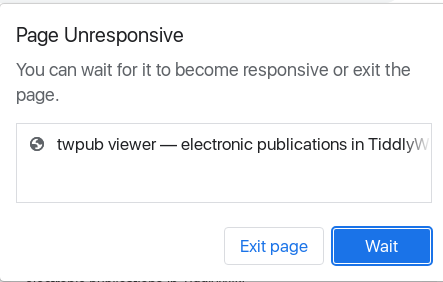Well it has being obscure for more than a decade and does not look like dying yet.
Of course PDF’s can be hosted within tiddlywiki as well.
However I think what you may be suggesting is using tiddlywiki as what I would call a “Smart Document”. In fact tiddlywiki can almost act like a document embedded inside it’s own “Document Management platform” and I am all for this.
Why PDF is popular?
- Free viewers are pervasive
- They can be distributed as URL’s or attachements
- In some ways PDF’s are somewhat defined by their own limitations.
- PDF’s are closely related to the paper document and can be readily printed
Tiddlywiki
- Free view in the browser but the browser needs to be secured
- Tiddlywiki can do this but the native html file is often blocked.
- TiddlyWiki has little or no limitations, this makes the out of the box solution too complex
- There remains issues dealing with pagination when exporting / printing from tiddlywiki
I think it tiddlywiki seems to have dies, it would be the same way in which “Linux died”, it is not a mainstream desktop but linux flavors, drive most network/router gear, mobile’s, TV’s and multi-media devices.
Tiddlywiki is already “public”, just as Logo or plasticine is public, except tiddlywiki is also free. Tiddlywiki democratises the use of computers, the internet and software but remains somewhat niche.
Personally I believe specific implementations or editions of tiddlywiki are what will gain “Public” prominence and then ultimately as a platform that drives specific implementations or editions.
- I have done this with “client customised” website/document, a but Smart Documents and other solutions are possible.
- Do say more on what you are thinking here, but I would love to see a Social media solution where we totally own our personal presence, like a Node.
- Always, but we do like sharing.
